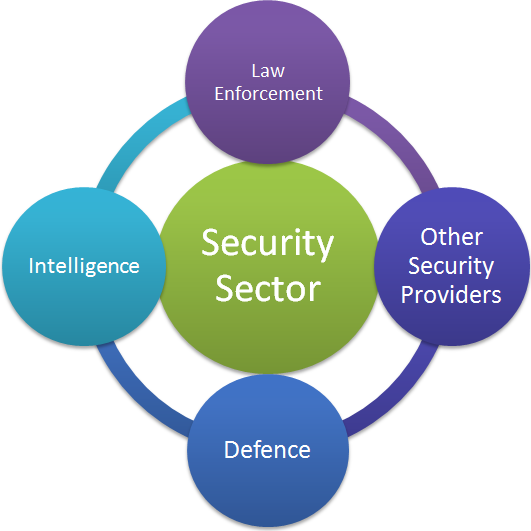Security Sector includes all security sector institutions and structures whose duty it is to protect the society from crime, disorder and violence. This includes: the armed forces and their civilian staff, law enforcement agencies (community police, investigations, border management services, penitentiary services), and intelligence services, as well as their civilian staff, educational and training establishments and corresponding logistical services. The objective is that the security sector is responsive to public needs and provides security as a public good. The security sector may also be argued to include regulated private entities with highly specified and limited roles related to protection of property and theft prevention.
The objective of the security sector is to provide security as a public good. The security sector is, therefore, subject to the same laws, rules and regulations as any other public service. Via transparent and accountable policies and practices, the goal of each security provider is to provide effective services in an efficient format. The key means for society and stakeholders to ensure that goal is achieved is by participating with democratic institutions, independent oversight agencies, government and the security sector itself, in democratic governance of the security sector. Democratic Security Sector Governance, essentially, means that the security sector is under democratic civilian control; that it aims to protect human rights, respect the rule of law and is accountable for its actions and performance.
Democratic Security Sector Governance (SSG): concerns the relationship between the state, as a provider of a public service, and the civil society as a receiver of that public service. This relationship must be built on trust and dialogue. The relationship must be participatory, consensus-oriented, accountable, transparent, responsive, effective, efficient, equitable, inclusive, and respect the rule of law.
Security Sector Reform (SSR): is defined by the United Nations as a process of assessment, review, and implementation as well as monitoring and evaluation led by national authorities that has as its goal the enhancement of effective and accountable security for the state and its peoples without discrimination and with full respect for human rights and the rule of law.[1]
[1] UNDPKO SSR Unit (2012), The United Nations SSR Perspective.




